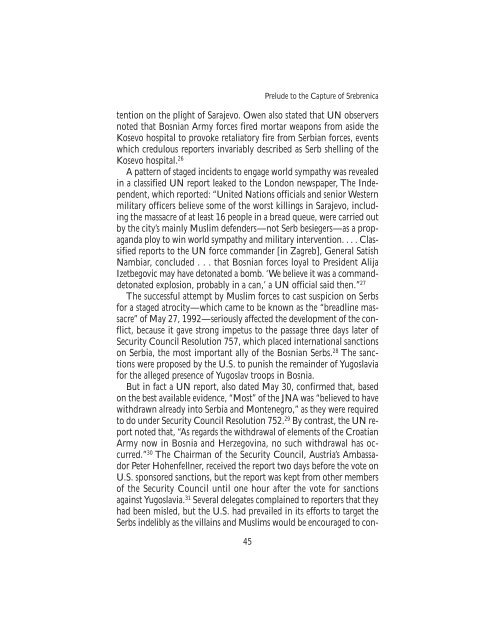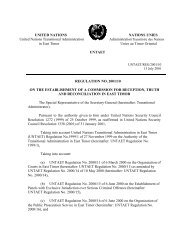The Srebrenica Massacre - Nova Srpska Politicka Misao
The Srebrenica Massacre - Nova Srpska Politicka Misao
The Srebrenica Massacre - Nova Srpska Politicka Misao
Create successful ePaper yourself
Turn your PDF publications into a flip-book with our unique Google optimized e-Paper software.
Prelude to the Capture of <strong>Srebrenica</strong><br />
tention on the plight of Sarajevo. Owen also stated that UN observers<br />
noted that Bosnian Army forces fired mortar weapons from aside the<br />
Kosevo hospital to provoke retaliatory fire from Serbian forces, events<br />
which credulous reporters invariably described as Serb shelling of the<br />
Kosevo hospital. 26<br />
A pattern of staged incidents to engage world sympathy was revealed<br />
in a classified UN report leaked to the London newspaper, <strong>The</strong> Independent,<br />
which reported: “United Nations officials and senior Western<br />
military officers believe some of the worst killings in Sarajevo, including<br />
the massacre of at least 16 people in a bread queue, were carried out<br />
by the city’s mainly Muslim defenders—not Serb besiegers—as a propaganda<br />
ploy to win world sympathy and military intervention. . . . Classified<br />
reports to the UN force commander [in Zagreb], General Satish<br />
Nambiar, concluded . . . that Bosnian forces loyal to President Alija<br />
Izetbegovic may have detonated a bomb. ‘We believe it was a commanddetonated<br />
explosion, probably in a can,’ a UN official said then.” 27<br />
<strong>The</strong> successful attempt by Muslim forces to cast suspicion on Serbs<br />
for a staged atrocity—which came to be known as the “breadline massacre”<br />
of May 27, 1992—seriously affected the development of the conflict,<br />
because it gave strong impetus to the passage three days later of<br />
Security Council Resolution 757, which placed international sanctions<br />
on Serbia, the most important ally of the Bosnian Serbs. 28 <strong>The</strong> sanctions<br />
were proposed by the U.S. to punish the remainder of Yugoslavia<br />
for the alleged presence of Yugoslav troops in Bosnia.<br />
But in fact a UN report, also dated May 30, confirmed that, based<br />
on the best available evidence, “Most” of the JNA was “believed to have<br />
withdrawn already into Serbia and Montenegro,” as they were required<br />
to do under Security Council Resolution 752. 29 By contrast, the UN report<br />
noted that, “As regards the withdrawal of elements of the Croatian<br />
Army now in Bosnia and Herzegovina, no such withdrawal has occurred.”<br />
30 <strong>The</strong> Chairman of the Security Council, Austria’s Ambassador<br />
Peter Hohenfellner, received the report two days before the vote on<br />
U.S. sponsored sanctions, but the report was kept from other members<br />
of the Security Council until one hour after the vote for sanctions<br />
against Yugoslavia. 31 Several delegates complained to reporters that they<br />
had been misled, but the U.S. had prevailed in its efforts to target the<br />
Serbs indelibly as the villains and Muslims would be encouraged to con-<br />
45



